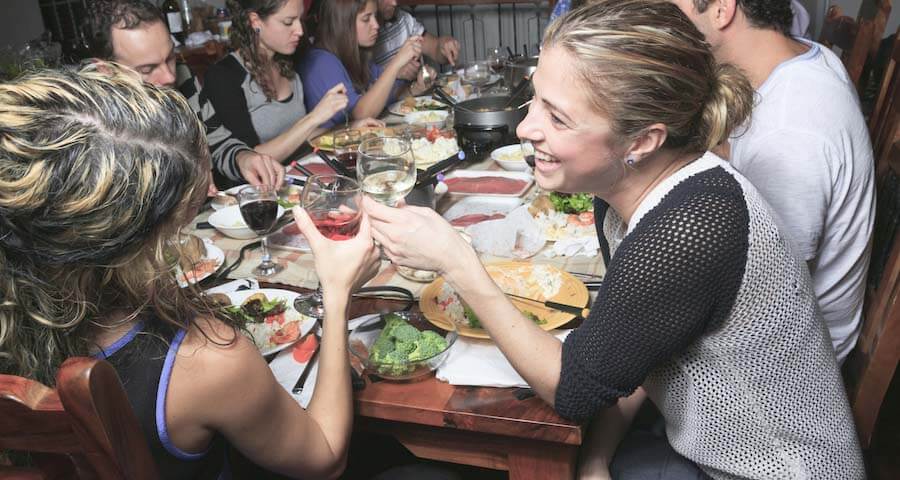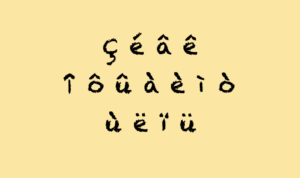A Culture of Customs in France
When you’re in France, the last thing you want to do is offend a French person. That’s why you should know the most important and common French customs and traditions, so you’re informed when you travel. Part of reaching French fluency is knowing about the culture and social norms of France. So, here are 14 interesting, weird, unique, and entertaining customs in French culture.
1. How to Greet French People
As far as social norms in France go, the most important you should know is how to greet French people. The French have a lot of different ways to say hello, so it’s not easy to navigate between the customs.
- Bises/kisses on the cheek: The traditional kisses on the cheek is a very important greeting in France. But, there are certain rules for it. Normally, it only happens with women, children, and men who are very close friends. Let a French person initiate the bises if you’re uncertain whether it’s appropriate or not. Usually, there are only two bises given, but in certain regions of France it can be up to 4.
- Handshake: When you meet a person for the first time, greet them with a handshake. Only after a second meeting switch to a more relaxed greeting.
- Always say “bonjour”: “Bonjour” means “good day”, and it’s the most common way to say hello in French. Whether you’re meeting a friend or walking into a shop, “bonjour” will always work well in French etiquette.
2. Should You Bring Wine to a Dinner Party in France?
While bringing a bottle of wine to a dinner party in the US is a thoughtful and polite gesture, it may not be in France. French dinner party hosts may think that you judge their hosting or wine serving abilities. They could think that you’re bringing a wine to drink for yourself because the wine your host chose won’t suit you. While this French social norm isn’t as serious as it may seem, it’s best to avoid offending the person who invited you to their home.
If you want to be safe, just in case, perhaps opt for a different gift to bring to a dinner party. Flowers are a very nice touch, but be careful, because certain flowers have meanings. You can also gift chocolates and sweets as well.

3. Are the French Always Late?
While in the US and the UK there’s a culture of arriving early, the French social norm is the exact opposite. French hosts need an extra 10-15 minutes to set up the table or fix their makeup before guests arrive. Arriving early (or even on time) shows that you expect to be entertained promptly. That’s why French people are always late. If everyone’s late, nobody is. It’s best to be fashionably late to dinner parties in France.
4. What Do French Kids Eat?
French food is exquisite, and even the kids know this. There’s no “kids menu” in France. While American children opt for chicken nuggets and French fries, French children eat the same kinds of food their parents do. Being well behaved at a table, and eating healthy meals is a requirement for every French child. Healthy eating habits are taught and followed even with school lunches in France. This French custom has defined generations of French cultural upbringing.
5. You Can Eat a Baguette On the Street
Speaking of eating, a very strange and unique social norm in France is that you can’t eat food on the street. While this part of French culture is fading away with the popularity of food trucks, it’s still important today.
However, there is one exception to this French custom: baguettes. As you’re walking home with a bag full of fresh, warm baguettes, it’s totally acceptable and customary in France to munch on their ends. But, only eat it until you reach the bag. If you keep eating the baguette from the bag, that’s the same faux pas as eating on the street.

6. Wedding Bells and Honking Horns in French Tradition
When a couple gets married there are a lot of cultural traditions to follow. And the French have their own unique traditions to add to weddings. On the way from the church to the reception, the entire wedding party honks their car horns as a French tradition. This makes for a very loud celebration.
But, what’s even better, sometimes strangers on the street join in too. Cars not part of the wedding party also honk their horn in celebration for the couple.
7. The French Tradition of Getting Slapped in the Face with a Fish
Yes, you read that right. The French have a tradition where you get slapped in the face with a wish. Carnivals are grand celebrations across France that date back hundreds of years. They signify the coming of spring, harvest, and having a good time. And of course, they all have their unique French traditions in every region.
In Dunkirk, the most peculiar French traditions happen. This custom is not one you’d forget if you ever experience it. People dress up in very colorful clothes to gather on the main square. As the party reaches its peak, they release 450 kilos (almost 1000 pounds) of herrings on the crowd. This is certainly one of the craziest and most unique French customs out there.
8. Celebrating French Wine is a French Tradition
French wine is exquisite. But, there’s one grape that deserves a special celebration in France: beaujolais nouveau. On the third Thursday of November (kind of like Thanksgiving) the production of this wine ends, and it finally arrives in stores. It’s a French custom to rush to supermarkets (kind of like Black Friday), or gather in a bar have a glass of beaujolais nouveau. This signifies the new season.
9. The French Custom of Ugly Hats
While French fashion is a very important part of French culture, there’s one holiday where French clothes aren’t exactly aesthetic. On November 25th, French customs celebrate St. Catherine’s Day. It’s customary to pray for a husband for unwed women over 25. These bachalorettes receive an ugly yellow and green hat from their married friends.
10. Gloomy Bachelor or Bachelorette Party Culture in France
While in the US bachelor and bachelorette parties are crazy parties with a lot of nudity and inflatable private parts, France has very different customs. They have a very dark and somewhat morbid view of the affair. It’s more like a French funeral. The party’s name is “enterrement de vie de garcon (EVG)/ jeune fille” literally translates to ‘funeral of the life of the young man/ woman’.

French grooms and brides-to-be wear comic tombstones or costumes to signify the end of their youth and freedom. This is definitely one of the weirder traditions French people have. Learning a new language causes less anxiety than the prospect of marriage in France.
11. Fishy April’s Fool Customs in France
April’s Fools is a day for pranks and jokes. In French customs, fish are the ultimate topic of comedy. That’s why this day’s called “Poisson d’Avril” (April Fish) in French. Some French traditions call for people to stick paper fish on the back of unsuspecting family members, friends, or even strangers. Newspapers also publish funny news with names of fish woven into the words for comedic effect.
12. Bastille Day is a French Holiday Tradition
The 14th of July marks the historic day of the storming of the Bastille Prison outside of Paris. This national holiday is the French version of the American 4th of July. Military parades march on the Champs-Élysées, and firework shows mark the celebration of this French tradition. Families gather outside for picnics and outdoor activities. It’s a very fun and patriotic French custom, if you’re in France on Bastille Day, make sure you take part.
13. Smaller Personal Space in French Social Norms
Personal space is not as important to the French as it is to Anglo-Saxons and Americans. They are comfortable with a distance of one foot, while British people normally stand about two feet apart. In general, when you see French people conversing, they will stand in closer proximity than British or American people.
14. 13 is Unlucky in French Superstition
It would be unwise to leave a list of French customs and traditions with only 13. That’s because 13 is an unlucky number in French superstition. Seating 13 guests at a table is a great faux pas. Just like there were 13 people around the table at the Last Dinner, with Jesus and the 12 apostles. Judas betrayed Jesus, so 13 is an unlucky number.
Learn French to Practice French Customs
While these French customs and traditions vary between regions, there’s one thing that ties them together. All of French people speak French. If you truly want to fit into French culture, you need to learn the language. Luckily, learning French is fun and easy with OptiLingo.
OptiLingo is an app that brings you results. By giving you only the most common French words and phrases, this app doesn’t waste your time. Guaranteed French fluency in minimal time. To start your language learning journey the right way download OptiLingo today!







